6 Sep 2016 | Campaigns, Campaigns -- Featured, Statements, Turkey, Turkey Reports
A delegation of international civil society organisations visited Istanbul to demonstrate solidarity with writers, journalists and media outlets in Turkey.
The failed coup of 15 July, in which at least 265 people were killed, has traumatised the Turkish population and the government must bring those responsible for the violence to account. However, this must be done on the basis of specific, individual evidence of involvement in a crime and with full respect for international standards on the right to freedom of expression, the right to liberty and security and the right to a fair trial, to which Turkey has committed as a member of the Council of Europe.
The delegation condemns the Turkish authorities’ abuse of the state of emergency to suppress diversity and dissent, and calls upon the government to immediately and unconditionally release all journalists detained in Turkey without evidence and to cease its harassment of the few remaining independent and opposition media outlets.
The mission led by ARTICLE 19, included representatives from Danish PEN, the European Federation of Journalists, German PEN, Index on Censorship, My Media, the Norwegian Press Association, the Norwegian Union of Journalists, Norwegian PEN, PEN International, Reporters Without Borders and Wales PEN Cymru. The representatives were in Turkey from 31 August to 2 September.
Meetings with journalists, representatives of media outlets, lawyers and human rights advocates undertaken during the mission give cause for alarm.
Dissenting voices have long been stifled in Turkey; however, the state of emergency, introduced in response to the failed coup attempt of 15 July, is now being used to legitimise an unprecedented crackdown on independent and opposition media.
Under the state of emergency decrees, an individual may be detained for up to 30 days without charges. This provision is being abused to arbitrarily detain journalists of diverse backgrounds and affiliations. As the mission departed Turkey, local media rights advocate, Punto 24, estimated that 114 journalists were in detention. At least 15 journalists were detained during the three days the delegates spent in Turkey.
Detention purely on the grounds of affiliation with the Gülenist movement, accused of being behind the coup, is in itself problematic, occurring without any individualised evidence of involvement in a criminal act. Moreover, the decree is also being used to arbitrarily detain journalists with absolutely no link to the Gülenist movement, including many representatives from opposition and minority groups.
Those detained are held for several days without charge, often without access to a lawyer or their family. There are worrying reports of poor conditions in detention, including beatings, severe overcrowding and a lack of access to essential medicines.
While a few independent media outlets continue to publish, this has created an atmosphere of pervasive self-censorship, depriving the population of free and diverse debate at a time when this is critically needed.
The state of emergency must not be abused to suppress freedom of expression. We call upon Turkey to demonstrate its commitment to democratic principles and to support full and broad public debate, by immediately and unconditionally releasing those held without evidence, and ceasing its harassment of independent media.
Supporting organisations
ARTICLE 19
Danish PEN
European Federation of Journalists
German PEN
Index on Censorship
My Media
Norwegian Press Association
Norwegian Union of Journalists
Norwegian PEN
PEN International
Reporters Without Borders
Wales PEN Cymru
Recent Index coverage of Turkey:
Kaya Genç: “This is your future … if your generation does not fight for it, it will be a disastrous one”
Charges must be dropped in high-profile trial of journalists following failed coup
Turkey is losing the rule of law
Ece Temelkuran: Turkey’s drive to make theatre “suitable”
Turkey’s continuing crackdown on the press must end
22 Aug 2016 | Campaigns, Campaigns -- Featured, mobile, Statements, Turkey, Turkey Statements
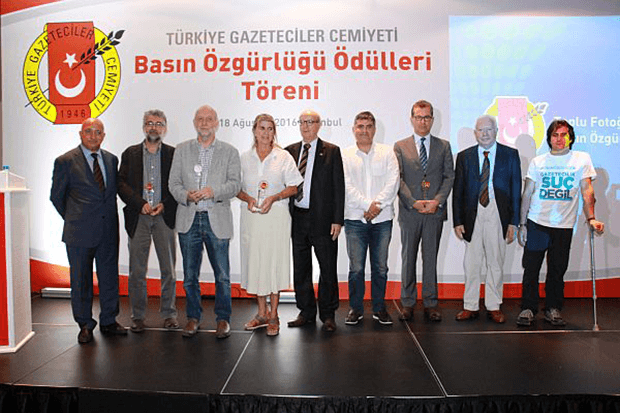
The awards were presented at a ceremony on Thursday 18 August. (Photo: TGC)
The Journalists Association of Turkey (TGC) on Thursday gave a 2016 Press Freedom Award to a coalition of international organisations, including Index on Censorship, that have worked in concert since last year to support journalists in the country and fight an ongoing deterioration in the state of press freedom.
“Press freedom cannot be taken for granted in any country and requires us to be constantly vigilant. As the post-coup crackdown continues, Index’s project Mapping Media Freedom is registering threats to the media, as well as publishing work from censored journalists, to help bring international attention to the issues. Index is grateful to be recognised for its work on behalf of the journalists of Turkey,” Rachael Jolley, deputy chief executive of Index on Censorship said.
The TGC award recognised the group of press freedom and free expression defenders, which came together as pressure on media increased ahead of the country’s second parliamentary election in 2015, for its collective efforts to bring awareness of press freedom violations in Turkey to the world at large and for supporting journalists of Turkey.
The group was assembled by the International Press Institute, which organised a press freedom mission to Turkey in October 2015.
IPI Executive Board Member Kadri Gürsel, chair of IPI’s Turkey National Committee, accepted the award on behalf of coalition members.
Noting the importance of international solidarity in support of Turkey’s journalists, he said that collective action is increasingly key, as pressure on independent media continues to increase under emergency rule declared in the wake of the failed July 15 coup.
The full text of Gürsel’s remarks appear below.
Honourable Chair,
Esteemed Jury members,
Fellow members of Journalists Association of Turkey,
Dear Guests,
Last year, Turkey provoked the creation of something that was the first of its kind in the world.
Almost all international press freedom organisations came together in order to form a coalition to defend the right of journalists in this country to perform their profession freely; a reaction to the political power having increased its repression of the freedom of the press to unprecedented levels in between the two elections.
The highly representative joint emergency press freedom mission of eight international organisations to Turkey on 19 to 21 October 2015 was the first of its kind in the world.
The mission was comprised of international and local representatives from the International Press Institute (IPI), the Committee to Protect Journalists (CPJ), Reporters Without Borders (RSF), the International Federation of Journalists (IFJ), the European Federation of Journalists (EFJ), Index on Censorship, ARTICLE 19 and the Ethical Journalism Network.
IPI’s Turkish National Committee and the Union of Journalists of Turkey, a member of the EFJ, endorsed the mission.
Showing solidarity with journalists in Turkey and underlining the fact in Turkey and abroad that growing pressure on independent media would jeopardise free and fair elections in the country – and of course demanding an immediate end to this pressure – were among the objectives of the mission.
The mission met with representatives of 20 media outlets in Istanbul and Ankara. It met with the representatives of opposition parties. It was impossible to get an appointment from the ruling party and from the office of President Erdogan.
The facts collected on the state of the freedom of the press in Turkey were shared with the world in a mission report published on Oct. 31, 2015. Suggestions were also made to make the situation better.
Despite its ad-hoc character, the coalition of international press freedom organisations for Turkey continued its activities with the participation of additional organisations.
The coalition coordinated the call of 50 leading editors around the world who on Oct. 30, 2015 urged President Erdogan to protect press freedom in Turkey.
It made a joint statement for the release of Cumhuriyet journalists Can Dündar and Erdem Gül, on Dec. 1, 2015.
The coalition made a joint statement to support a mission by RSF to Istanbul with the same purpose.
Representatives of organisations forming the coalition on Jan. 26, 2016 repeated their call for the release of Can Dündar and Erdem Gül at the gates of Silivri prison in Istanbul where the two journalists were held.
The coalition called on Turkey to drop all charges against the Cumhuriyet journalists on March 24, a day before their politically motivated trial.
Coalition members have also been active in submitting alerts to the Council of Europe’s platform to promote the protection of journalism and safety of journalists.
I’m standing here today on behalf of the coalition of international press freedom organisations for Turkey to receive this year’s Press Freedom Award of the Journalists Association of Turkey on the category of Institutions, given to the coalition.
On this occasion, I would like to mention names of member organisations of the coalition:
ARTICLE 19
The Committee to Protect Journalists (CPJ)
The Ethical Journalism Network (EJN)
The European Federation of Journalists (EFJ)
The International Federation of Journalists (IFJ)
Index on Censorship
PEN International
The International Press Institute (IPI)
Reporters Without Borders (RSF)
The World Association of Newspapers and News Publishers (WAN-IFRA)
On behalf of the member organisations, I extend our sincerest gratitude and thanks to the Journalists Association of Turkey for their decision to grant this year’s press freedom award to the coalition.
This award is very meaningful for us because it shows that the international solidarity made for the freedom and future of journalism is fairly evaluated and appreciated.
As facts have shown, the international solidarity of journalists has always been effective and a deterrent to repressive regimes that put media under pressure in order to prevent the public from being informed freely and objectively.
International solidarity is becoming more important these days; the repression of journalists and the media is gaining a destructive character with the unlawfulness of the emergency rule, insofar as the failed coup of July 15 has been used as a pretext for its implementation.
In consciousness of this fact, we are very thankful to the honourable jury members for granting us this award.
Full details of the awards are available are here.
Index will be exploring the situation in Turkey in a series of upcoming events:
12 Sept: Turkey beyond the headlines
Acclaimed writer Kaya Genç will talk to Rachael Jolley, editor of Index on Censorship magazine, about his forthcoming book Under the Shadow: Rage and Revolution in Modern Turkey.
15 Sept: The State of Turkey with Kaya Genç, Ece Temelkuran and Daniel Trilling
Join Index on Censorship magazine’s contributing editor Kaya Genç and fellow Turkish writer Ece Temelkuran for a discussion about the state of Turkey in the aftermath of the failed military coup.
20 Sept: Author Ece Temelkuran on the struggles that have shaped Turkey
Join Index on Censorship’s CEO Jodie Ginsberg as she presents an evening with award-winning journalist and novelist Ece Temelkuran to discuss her latest book Turkey: The Insane and the Melancholy.
27 May 2016 | About Index, Azerbaijan, Europe and Central Asia, mobile, News and features
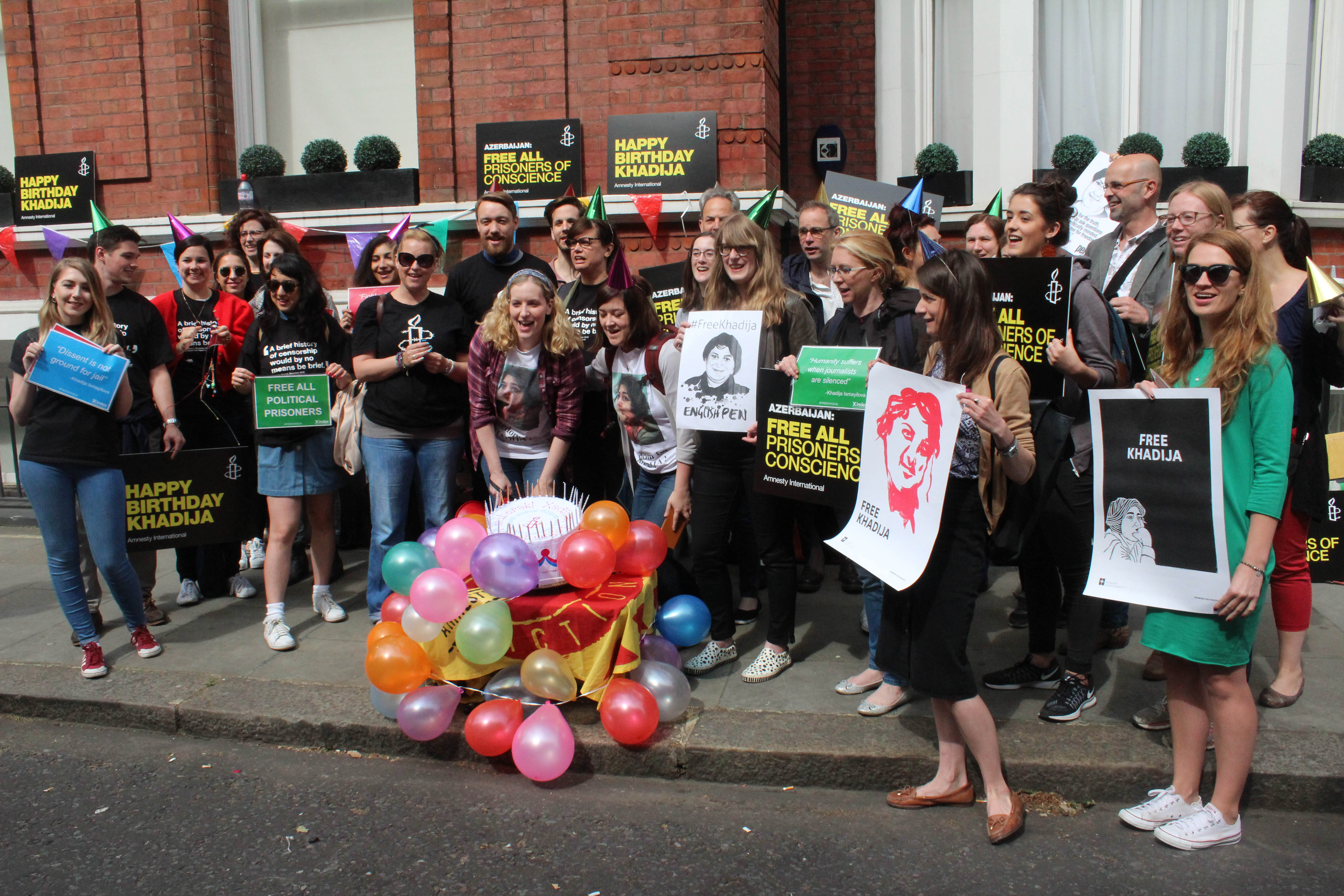
Protest for Khadija Ismayilova, Azerbaijan embassy, London. Credit: Cat Lucas, English Pen
Azerbaijani investigative journalist Khadija Ismayilova may have been released from prison on Wednesday, but two trumped-up charges against her — illegal entrepreneurship and tax evasion –remain. Her seven-and-a-half-year jail sentence has only been reduced to a three-and-a-half-year suspended term and she isn’t free to leave the country.
Today is Ismayilova’s 40th birthday and to mark the occasion, protesters gathered at 40 different demonstrations from around the world, not just to celebrate, but to call for all charges against her to be quashed. Index joined other members of the Sports for Rights coalition at the Azerbaijani embassy in London (see above).
“Let’s take a moment to celebrate the work that’s been done by this remarkable woman,” Rebecca Vincent, the co-ordinator of the Sport for Rights campaign, told demonstrators.
Currently, around 70 political prisoners — including journalists, bloggers, activists and religious followers — sit in Azerbaijani jails, and Vincent called on protesters to sustain their focus on all of them. “That’s what Khadija has asked for for her birthday,” she said.
Seymur Hezi is an Azerbaijani journalist serving a five-year prison sentence on charges of “aggravated hooliganism”. Hezi, who contributed to the Index on Censorship Freedom of Expression Award-winning newspaper Azadliq, was sentenced on 29 January 2015. He was arrested on 29 August 2014 following an altercation in which the journalist was defending himself from a physical assault and harassment, according to his lawyers. “His case doesn’t get enough international attention, possibly because he is not an English speaker and not well networked,” Vincent said.
Other political prisoners include Ilgar Mammadov, the opposition politician who leads Azerbaijan Republican Alternative Movement, who has been in jail for over three years, and Ilkin Rustemzade, the activistt originally jailed following his Harlem Shake video filmed in Baku.
On the same day Ismayilova was released, two more political prisoners, a youth activist and a journalist, were arrested.
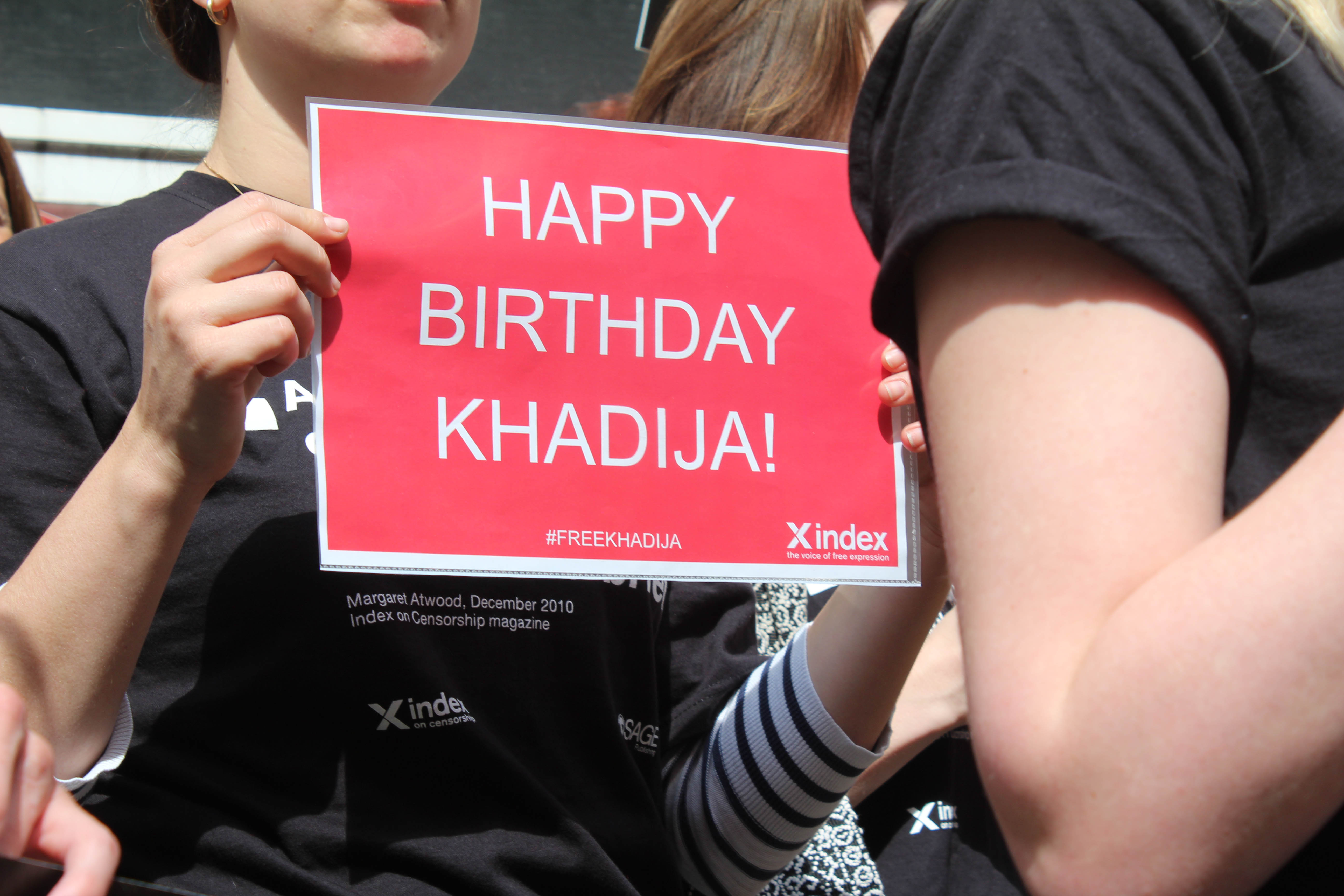
Protest for Khadija Ismayilova, Azerbaijan embassy, London. Credit: Cat Lucas, English Pen
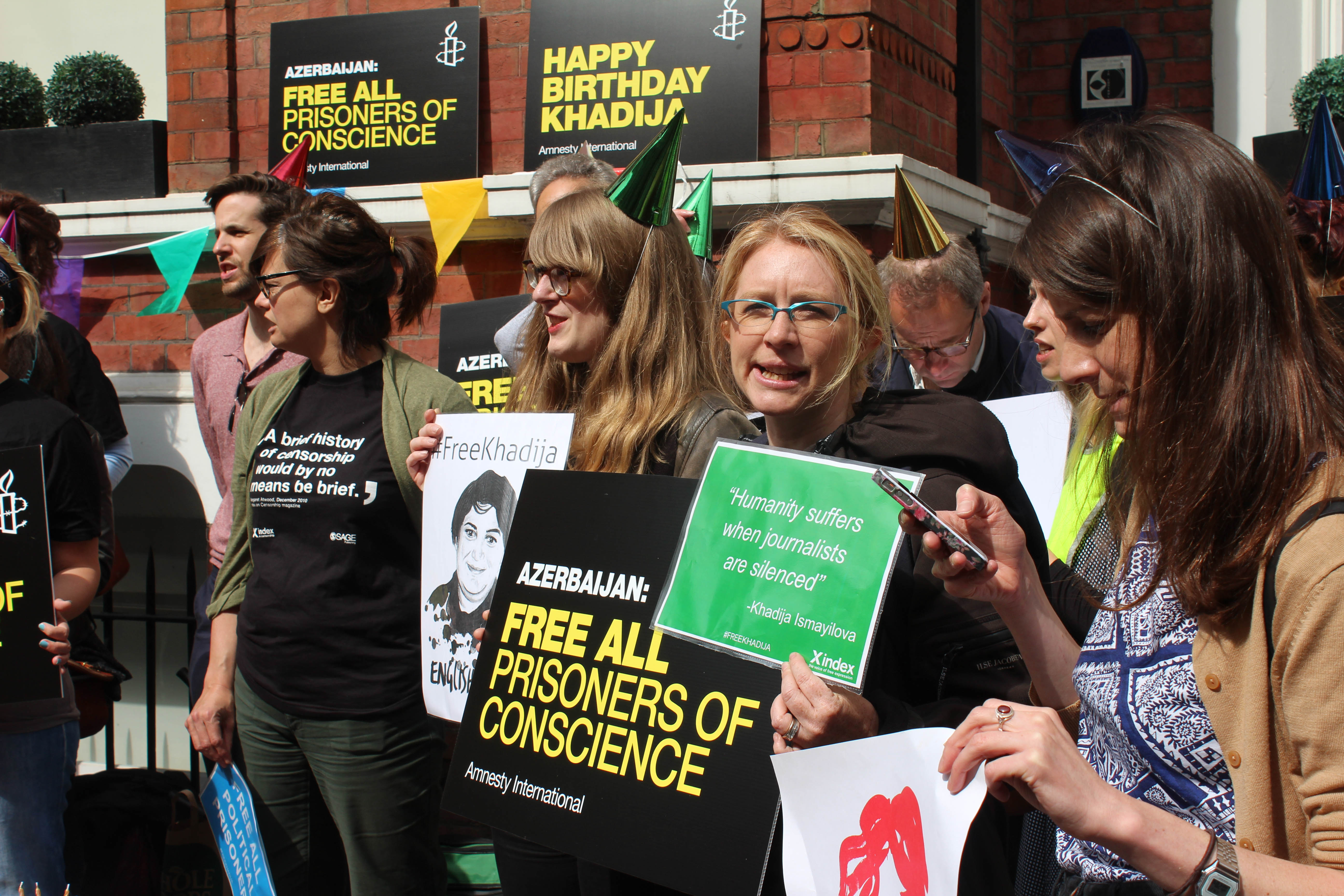
Protest for Khadija Ismayilova, Azerbaijan embassy, London. Credit: Cat Lucas, English Pen
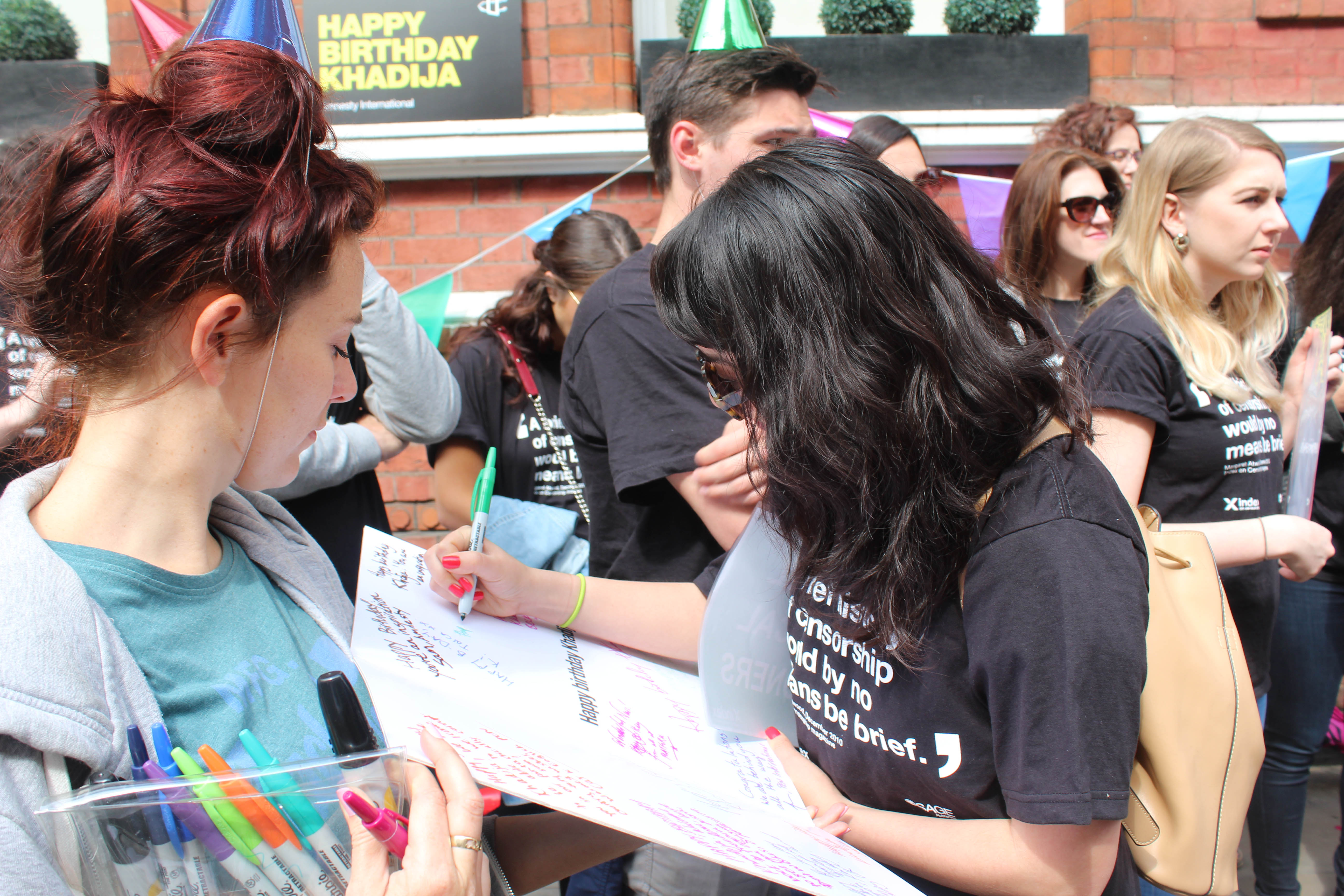
Protest for Khadija Ismayilova, Azerbaijan embassy, London. Credit: Cat Lucas, English Pen
Many more protests took place today. Here are some of them:
Paris, France
Washington DC, USA
Brussels, Belgium
Oslo, Norway
18 May 2016 | About Index, Campaigns, Campaigns -- Featured, Counter Terrorism, Statements, United Kingdom
The government’s planned Counter-Extremism and Safeguarding Bill must be carefully crafted to avoid damaging freedom of expression.
“The government’s move to counter extremism must not end up silencing us all,” said Jodie Ginsberg, Chief Executive of Index on Censorship. “We should resist any attempts to make it a crime for people of faith to talk publicly about their beliefs, for political parties to voice unpopular views, and for venues from universities to village halls to host anyone whose opinions challenge the status quo. We urge the government to use its consultation to ensure this does not happen.”

The government’s plans to tackle extremism through a “new civil order regime” and other measures must not undermine the very values it aims to defend, free expression organisations said on Wednesday.
Index on Censorship, English PEN, the National Secular Society, the Christian Institute, ARTICLE 19, Big Brother Watch, Manifesto Club and the Peter Tatchell Foundation welcomed plans to consult on the matter, following their demands earlier this year.
The proposals for a new law, outlined in the Queen’s Speech, are more ambiguous than earlier proposals made by this government, but nevertheless leave open broad measures to police a wide swathe of speech and should be resisted, the groups said.
The new legislation will include giving law enforcement agencies new powers to protect vulnerable people – including children – “from those who seek to brainwash them with extremism propaganda so we build a stronger society around our shared liberal values of tolerance and respect”, according to the background notes accompanying the Queen’s Speech.
More specifically, the government proposals are to legislate:
· Stronger powers to disrupt extremists and protect the public.
· Powers to intervene in intensive unregulated education settings which teach hate and drive communities apart.
· A new civil order regime to restrict extremist activity, following consultation.
· Closing loopholes so that Ofcom can continue to protect consumers who watch internet-streamed television content from outside the EU on Freeview.
The new proposals should avoid creating an environment that could make it even harder for people of all faiths and ideologies to express their beliefs and opinions, the groups said. Current legislation already prohibits incitement to violence and terrorism, and a compelling case for broadening them further through civil measures has not been made.
“The government’s move to counter extremism must not end up silencing us all,” said Jodie Ginsberg, Chief Executive of Index on Censorship. “We should resist any attempts to make it a crime for people of faith to talk publicly about their beliefs, for political parties to voice unpopular views, and for venues from universities to village halls to host anyone whose opinions challenge the status quo. We urge the government to use its consultation to ensure this does not happen.”
The groups said plans to introduce new laws in this area presented three main risks:
1. Definitions
It is still not clear how new legislation would deal with the problem of defining “extremism” in a way that would not threaten free speech.
The government has previously defined extremism broadly as “the vocal or active opposition to fundamental British values, including democracy, the rule of law, individual liberty and the mutual respect and tolerance of different faiths and beliefs”. The continued lack of a clear definition risks outlawing any political expression that does not reflect mainstream or popular views.
Britain already has a host of laws to tackle the incitement of terrorist acts, as well as racial and religious hatred. The government has previously been criticised for the broad definitions of “terrorism” in existing legislation, and the definition of ”extremism” in the Prevent Strategy. The proposed bill must not introduce new vague terminology and widen the net even further.
“The government’s approach to extremism is unfocused. Unless we can make them see sense, the range of people who could find themselves labelled ‘extremist’ by their own government is about to get a whole lot wider,” said Simon Calvert of the Christian Institute.
2. Nature of new civil orders
The government is ambiguous on whether they are still considering “extremism disruption orders” or “banning orders” within the package of civil measures. Though the promised consultation is welcome, these draconian measures are clearly not off the table.
Baroness Manningham-Buller, former head of MI5, has said previously that extremists need to be exposed, challenged and countered. The proposed measures would have the opposite effect and should not find their way into the new civil order regime.
“Extremism banning orders could mean political activists – or any other activists deemed to be ‘anti-democratic’ – such as environmental activists – could be outlawed in future, thereby undermining democracy itself,” said Jo Glanville, Director of English PEN.
Extremist disruption orders (EDO), suggested under earlier plans for the bill, could have a similar chilling effect on free expression and democracy. Under original plans for EDOs, the police would be able to apply to the high court for an order to restrict the “harmful activities” of an “extremist” individual. The definition of “harmful” could include a risk of public disorder, a risk of harassment, alarm or distress, or the ill-defined “threat to the functioning of democracy”.
Keith Porteous Wood, Executive Director of the National Secular Society, said: “The prosecution thresholds for EDOs – as originally envisaged – are worryingly low – civil, not criminal – yet the consequences of granting of such an order, even if not broken, are likely to be very serious, e.g. rendering the recipient unemployable. Few faced with such a threat are likely to have the resources to mount any defence as proceedings will be at the High Court.”
“No convincing case has been made for the necessity of new measures to restrict free speech. Existing measures are already deterring individuals and groups from engaging in open debate on important issues. The plans re-announced today, though watered down, do not sufficiently address criticism the government has received; they not only threaten to further chill legitimate speech, but may also fuel divisive ideologies and make us less safe,” said Thomas Hughes, Executive Director of ARTICLE 19.
3. International implications
Governments across the world – such as Russia, Turkey and Egypt – are increasingly using national security laws to censor free expression, including in the media. The government’s moves are likely to legitimise and embolden these efforts, setting a counter-productive example.
UN and regional human rights experts have jointly raised concerns regarding the potential impact of broadly defined initiatives to counter violent extremism on the free expression of minority and dissenting views. They have called for responses to violent extremism to be evidence based, and to respect international human rights law on freedom of expression and non-discrimination.
Conclusion
We call on the government to consult widely with all stakeholders, including civil society and minority groups, to ensure that a bill intended to tackle extremism does not undermine one of the values at the heart of democracy: that of free speech for all.
For more information or to arrange interviews, please contact:
– Melody Patry, head of advocacy, Index on Censorship.
[email protected]; 0207 963 7262
– Robert Sharp, head of communications, English PEN
[email protected]; 020 7324 2535






